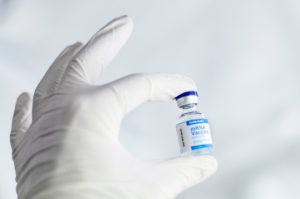How COVID-19 Impacts the Surrogacy Journey
An honest and evidence-based summary
We are now over two years into a pandemic that has led to changes across all areas of our lives, resulting in what we call “the new normal.” Both intended parents and potential surrogates are likely wondering how this coronavirus pandemic impacts all things surrogacy, from matching, to embryo transfer, to doctor’s visits and traveling. There are many factors that can impact how your surrogacy journey goes, such as location and specific clinic restrictions. This blog post is our best effort to provide an overview on what to expect, but we recommend checking with the protocols of your clinics, doctor offices, and hospitals to help answer any questions or concerns. Of course, feel free to reach out to us with anything!

How does Covid-19 impact pregnancy? At the beginning of the pandemic, there were many uncertainties about how Covid-19 impacts pregnancy, for both the baby and the carrier. Now we know from research that being pregnant does not put you at a higher risk of contracting Covid-19, but pregnant people who contract Covid-19 do have a higher likelihood of severe illness. Still, the overall risk of severe illness and death for pregnant women remains low.
As for the health of the baby, fortunately research suggests that the cells of the placenta don’t allow SARS-CoV-2 to travel to a developing baby and the risk of a baby being born with Covid-19 is very low. Additionally, most newborns who have tested positive for Covid-19 have mild or no symptoms. That said, there is some data to suggest that having Covid-19 during pregnancy increases the risk of delivering a preterm or stillborn infant.
There are many steps you can take that will greatly reduce the chances of contracting the virus, such as avoiding busy, enclosed areas, wearing a mask even when it’s optional, and regularly washing your hands. If you are concerned about how the virus may impact you, we recommend speaking with your primary physician or OB/GYN.
How does the Covid-19 vaccine affect pregnant people? Covid-19 vaccines have been shown to be safe for both the baby and the carrier. The vaccines can help protect you from severe illness and the antibodies made by your body may be passed to the fetus, helping to protect the baby after birth. Being vaccinated and boosted lowers the risk of miscarriage or stillbirth. The American Society for Reproductive Medicine and American College of Obstetricians and Gynecologists both strongly recommend that pregnant people and those looking to become pregnant receive the Covid-19 vaccine and booster(s). At Brownstone, we also encourage all gestational carriers to get vaccinated.

Do I need to be vaccinated? Perhaps one of the most common questions we hear is whether a prospective surrogate needs to be vaccinated before beginning the journey. The vast majority of fertility clinics require that a gestational carrier be vaccinated against Covid-19. Similarly, the vast majority of intended parents want to match with a surrogate who has been vaccinated against Covid-19. As a result, while receiving the vaccine is not an absolute requirement, we strongly encourage all surrogates to be vaccinated, for their own safety and wellbeing, for the health and welfare of the child they will be carrying, and to help with the matching process. We can still match unvaccinated surrogates, so long as all parties (surrogate, intended parents, and clinic) are on the same page.
Is now the right time? Should you start the surrogacy process now or wait until things go back to pre-Covid times? While we can offer our advice, address your concerns, and answer any questions you have, only you know what’s best for yourself at this time. We urge you to consider your concerns on beginning this journey during a pandemic and decide whether these concerns outweigh the pros of becoming a surrogate or having a child through surrogacy. As we have seen, the pandemic is unpredictable and therefore there might never be the “perfect” time to embark on this journey. As an agency, we can reassure you that we will take every step to ensure that you feel safe and comfortable prior to, during, and after your pregnancy.
How does the pandemic affect travel? Domestic travel, for the most part, has gone back to pre-covid times, making travel easier than it has been in the previous two years. However, traveling on airplanes may increase your risk of contracting the virus, and therefore the decision to travel long distances ultimately falls in your hands. As a surrogate, if you wish to be matched with intended parents within driving distance to avoid the hassle of having to fly, we will certainly try our absolute best to honor your preference.
While in-person meet-ups were popular pre-Covid, the pandemic has popularized many alternative communication options, such as Zoom and FaceTime. Therefore, even with reduced travel, intended parents and surrogates can still bond and build trust. Appointments (as discussed in the next section), can also be done over FaceTime to further reduce travel on both parties’ ends.
How do Covid protocols affect prenatal care and delivery? Who can be in the room for the embryo transfer? Who is allowed in the doctor’s office for the routine appointments? Who can be in the delivery room? These are all really great questions and the answers ultimately depend on the specific clinic, doctor’s office, and hospital. Some clinics no longer allow intended parents into the room during the embryo transfer. Many do, however, allow the spouse of the surrogate for emotional support. Even if the intended parents are not in the room, they can still show support via FaceTime. In some situations, intended parents, surrogates, and any emotional support may have to show proof of vaccination or negative Covid-19 tests before starting the process.
Routine check ups throughout the pregnancy may also have these same restrictions. We recommend utilizing FaceTime or WhatsApp here as well to recall any information from the doctor to the intended parents. Recording the appointment on video or having the intended parents call in live for the appointment can help ensure that all information is relayed.
For delivery, it depends on the hospital’s protocols; respecting those protocols are critical to ensuring a safe delivery process. Brownstone will liaise with the hospital to make sure all parties know exactly what to expect well in advance of the delivery date and can prepare accordingly!
* * *
Despite the ongoing nature of this pandemic, our agency can promise that we will do our best to keep you safe and prepared. If you are on the fence of beginning your surrogacy journey during the pandemic, we are here to offer any guidance and ensure that you can confidently make your decision. Please feel free to reach out with any questions or concerns!
